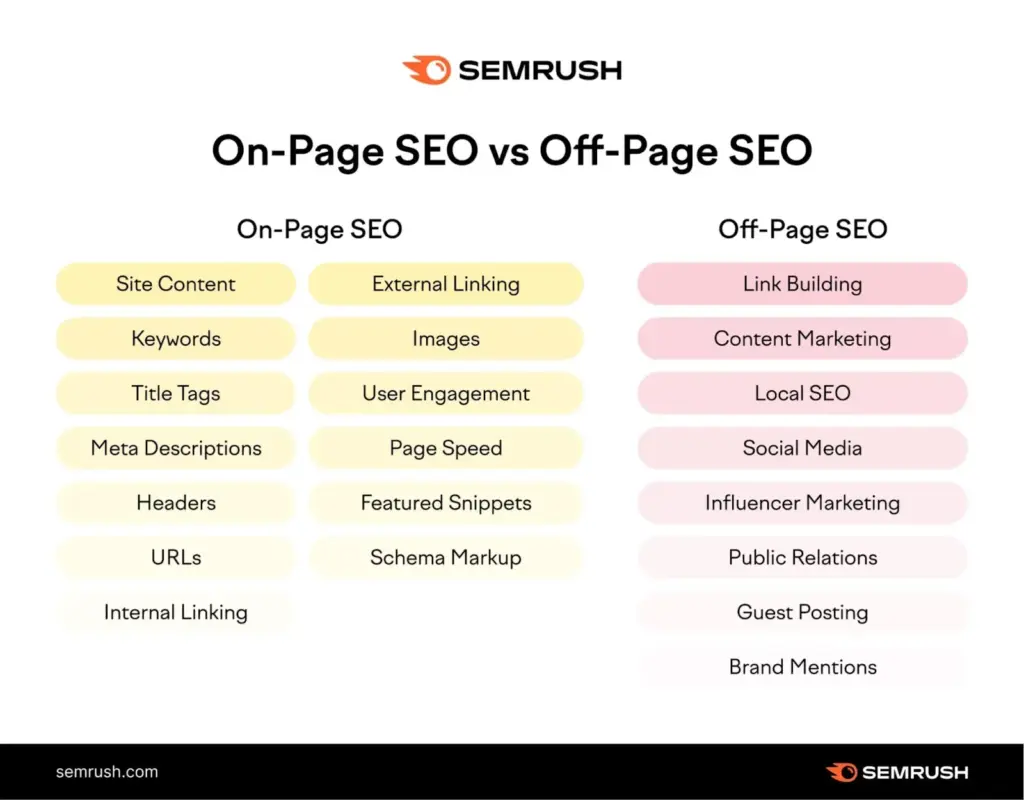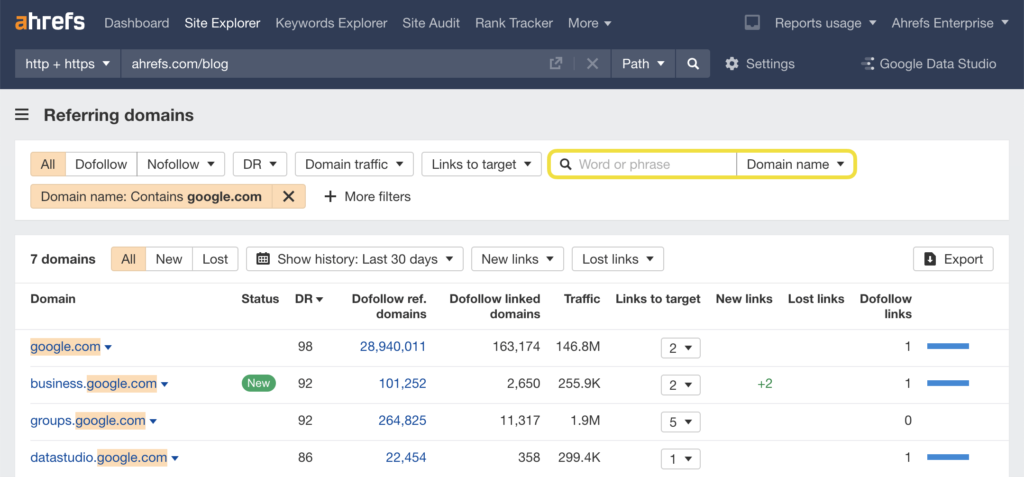
Off-Page SEO: How to Make Your Website Rank Higher on Google
You can’t say enough good things about SEO (Search Engine Optimisation) when it comes to digital marketing.
Off-page SEO methods are often the “unsung heroes” that get websites to the top of search engine results, even though most webmasters and content writers put all of their attention on on-page SEO strategies.
This piece goes into great detail about off-page SEO, explaining why it’s important and giving you tips on how to make your website more visible and trustworthy.
What does Off-Page SEO mean?
Off-page SEO includes all the different plans and actions that aren’t on your website itself but still have an effect on where you show up in search engine results pages (SERPs).
Off-page SEO is different from on-page SEO in that it focuses on building your site’s image and authority through outside sources. On-page SEO is about optimising parts of your website like content and HTML source code.
This includes everything from building links and interacting with people on social media to using celebrity marketing and more.
Why is it important to do off-page SEO?
The way search engines, like Google, see and rank websites is what makes off-page SEO important.
Not only do search engines look for high-quality, relevant content, they also look for signs that the content is trustworthy, authoritative, and popular with internet users.
Off-page SEO helps build this impression by showing search engines that your website is useful to people, which means it should rank higher in search results.
Basics of Off-Page SEO
Several important things make up the base of off-page SEO:
- Link building: is the process of getting other websites to link to yours. A connection, which people usually just call a link, lets people move from one web page to another. The search engines use these links to “crawl” the web. They will follow the links between your website pages and the links between websites as a whole.
- Social Media Engagement: People are still arguing about whether or not social media has direct SEO benefits. However, there’s no doubt that a strong social media presence can improve your off-page SEO by bringing more people to your website and making your brand more visible.
- Mentions of Brands: Mentions of your business, whether they are linked or not, can help your SEO. Search engines will see these comments as proof that people are talking about your brand, which can boost the authority and rankings of your site.

How to Use Backlinks to Get Off-Page SEO Going
Inbound links, also known as backlinks, are probably the most important part of off-page SEO. They say good things about a site from another site.
However, not every connection is the same.
Backlinks from high-quality, relevant sites that are known to be trustworthy have the biggest effect on your results. On the other hand, backlinks that are spammy or of low quality can hurt your SEO.
Do an analysis of your website’s backlinks.
A backlink study is an important step in figuring out where your website stands in the digital world and finding strategic ways to make it better for SEO.
In this step, you look at how many, what kind, and how many different websites link back to yours. In just a few steps, here’s how to do a backlink study right:
- Pick a Backlink Analysis Tool: To start, pick a backlink analysis tool that you can trust. Ahrefs, SEMrush, and Moz’s Link Explorer are all popular choices. These tools give you a lot of information about your backlink profile, like how many backlinks you have, the quality of the sites that link to you, how the anchor text is distributed, and more.
- Look at the number and quality of backlinks: Check both the number and, more importantly, the quality of the connections. Backlinks that are of high quality come from sites that are trustworthy and related to your business. Search engines give more weight to links from sites with a high name authority.
- Look at the variety of links: Check how diverse your backlink profile is by looking at the different types of sites that link to you, such as blogs, news sites, and educational sites, as well as the different countries from which these sites are linked. Search engines think that your content is useful for many people if you have a diverse set of links pointing to it.
- Find Toxic Links: Use the tool of your choice to find backlinks from spammy or useless sites that could be harmful. These things can hurt how well your SEO works.
- Find chances to get new backlinks: Look for trends in the backlinks that are linking to you to figure out what kind of content or outreach methods are working best. You should also look at your rivals’ backlink profiles to find sites that might link to yours.
- Plan to Make Things Better: After you’ve done your research, come up with a plan to keep good backlinks, get rid of bad ones, and look for new linking possibilities. This could mean making more of the types of content that have worked in the past to get backlinks or getting more involved with important online communities and influencers.
A full backlink analysis tells you a lot about your site’s SEO health and helps you figure out how to improve your online authority and search engine rankings.
Send out brand signals
company signals are the different ways that people and other websites talk about and interact with your company online. This can include things like reviews, social media activity, mentioning the company name, and more.
Search engines can tell that your brand is real, trustworthy, and an expert in its field if it has strong brand signs.
Get better Expertise, Authoritativeness, Trustworthiness, and Experience are what E-E-A-T stands for. This idea is at the heart of Google’s rules, which stress how important good material is and how trustworthy the people who make it are.
To improve your website’s E-E-A-T
Through off-page SEO, you need to get good reviews, be mentioned on trustworthy websites, and have your brand’s experts become thought leaders in their areas.
Spend more on content that is long.
There is a false belief that publishing longer articles will instantly bring in backlinks. The truth is more complicated and needs careful planning.
Still, putting time and effort into writing detailed, thorough material greatly increases the chances that other people will find and link to your work. This is more than just an idea; facts back it up.
The search engine BuzzSumo looked at more than 900 million blog posts and found an interesting pattern. It was found that stories with a lot of depth and breadth, which is what we call “long-form content,” consistently got 77% more backlinks than shorter articles.
This information makes a very important point clear: material depth is important. Because long-form content is thorough and can provide a lot of value, it makes sense for other websites and content creators to quote and reference it in their own work.
Backlinks, which are these references, are not only signs of respect; they’re also important for a site’s SEO and its ability to rank better in search engine results pages (SERPs).

Another type of off-page SEO
Aside from the above techniques, there are other off-page SEO methods that can also help your site rank higher:
Using influence to build links through influencer marketing
Influencer marketing uses the reputation and following of well-known people in your field or a related field. When brands work with influencers, they can reach more people, which boosts their credibility and exposure.
It helps with off-page SEO in the following ways:
- Strategic Partnerships: Find influential people whose ideals are similar to your brand’s and who have a large following among your target audience. Influencers who work with you on sponsored posts, product reviews, or content creation can share this content with their fans, which can bring natural, high-quality backlinks to your site.
- Content Amplification: Influencers can spread your content to more people, making it more likely that other people will see it and link to it. This not only brings in direct traffic, but it also increases the chances of getting more backlinks from other websites that were inspired by the content shared by the celebrity.
- Better Brand Perception: Being associated with well-known influencers can raise the standing of your brand in your field, which makes it more likely that other sites will see your content as trustworthy and want to link to it.
Setting up authority and building links through guest blogging
When you guest blog, you write content for other websites in your niche or business. This off-page SEO approach is useful for more than one thing:
- Direct Backlinks: If you write for useful websites, you can put links to your own website in the text or in your author bio. These straight backlinks are good for SEO because they bring more people to your site and boost its authority.
- Building authority: Putting out smart, useful content on well-known sites can help your brand or key team members become thought leaders in your area. This gives your site more authority, which makes it a better target for backlinks.
- Network Growth: Regular guest blogging can help you meet new professionals and find new ways to work together. It can also help you get your name out there to new groups.
Participation in forums: Bringing more people and making yourself more visible
Off-page SEO can also be helped by actively participating in groups related to your business:
- Participation in the community: Joining forum talks is a great way to get to know your target audience, answer their questions, and share your thoughts. Most forums have strong rules against spamming, but if you post useful information, people will naturally be interested in your website.
- Backlinks from your profile: A lot of sites let you make a profile with a link to your website. Most of the time, these links are nofollow, which means they don’t have an effect on SEO directly. However, they can still bring specific traffic to your site.
- Brand Awareness: Regularly and helpfully participating in forum talks raises awareness of your brand and can indirectly lead to backlinks. As people start to see you as an expert in your field, they’ll be more likely to link to and talk about your site in related discussions.
To use these strategies successfully, you need to pay attention to quality, relevance, and real engagement. The goal is to add value to your audience and business, whether that’s through guest blogging, working with influencers, or joining forums.
This method not only improves your off-page SEO, but it also gives your brand a strong online profile.
Off-Page SEO Frequently Asked Questions
Is Off-Page SEO Hard?
Off-page SEO can be hard because it depends on things you can’t directly change, like getting backlinks, having a social media profile, and building relationships with influencers. Consistent work, smart networking, and making high-quality content that other people want to link to or share are all things that will help you succeed.
How can I check my off-page SEO?
To check your off-page SEO, look at things like the number and quality of backlinks, how often your brand is mentioned online, how active you are on social media, and how well your content does on other sites. Tools like Ahrefs, SEMrush, and BuzzSumo can help you keep track of these measures and give you information about how well your off-page SEO is working.
What is Technical SEO, On-Page SEO, and Off-Page SEO?
- On-Page SEO: includes making changes to parts of your website that can help it rank higher, like the quality of the content, how you use keywords, and the meta tags.
- Off-Page SEO: focuses on things that happen outside of your website, like gaining backlinks, using social media, and forming relationships with influencers, to boost the authority and rankings of your site.
- Technical SEO: includes changes to your website and server that make it easier for search engine spiders to crawl and process your content. These changes can improve your site’s speed, mobile friendliness, and structured data, among other things.
How long does it take to do off-page SEO?
Off-page SEO has a wide range of effects, and it can take anywhere from a few months to a year to see real changes. It depends on a lot of things, like how competitive your field is, how good your backlinks are, and how much domain authority your site already has.
Does Off-Page SEO still work for SEO?
Yes, off-page SEO is still an important part of a full SEO plan. Backlinks from high-quality sites and social signals are still important to search engines and affect your site’s influence and rankings.
What is the key to Off-Page SEO that works?
For off-page SEO to work, you need to get useful, high-quality backlinks from trustworthy sources. To do this, you need to make useful content that other people want to link to, interact with your online community, and form relationships with influential people in your field.
With off-page SEO, how do I get my keywords to rank?
To rank keywords with off-page SEO, you need to:
- Getting backlinks from trustworthy sites that use your goal keywords in the anchor text.
- Getting more people to share and talk about your content on social media will help it get more attention.
- Participating in online forums and community talks can help your brand’s visibility and keyword association.
What is the first thing that Off-Page SEO does?
Off-page SEO starts with making great content that people want to share and that automatically gets backlinks and social shares. Also, you should do a backlink analysis of your website to see what your present link profile looks like. This will help you find opportunities and places to improve.
Will Off-Page SEO help our rank?
Of course. Off-page SEO can help your website’s ranking a lot by making it more authoritative, trustworthy, and relevant in the eyes of search engines. We can do this by building a strong online business presence, using social media, and strategically putting links back to our site.
Last thoughts
Finally, off-page SEO is an important part of a complete SEO plan that is often overlooked.
You can improve your website’s ranking, authority, and exposure in SERPs by focusing on off-page tasks like creating strong brand signals, building high-quality backlinks, and making your E-E-A-T better.
Don’t forget that SEO is a race, not a sprint. Long-term success depends on being consistent and doing a good job.
Do you know a lot about this? We’re always looking for new ways to add unique insights and deep knowledge to our material. If you have useful information to share, you might want to write for us. We’ll give you credit for your work so that our huge audience can see how knowledgeable you are. Feel free to email editor@freeonlinedirectory.in to begin.












